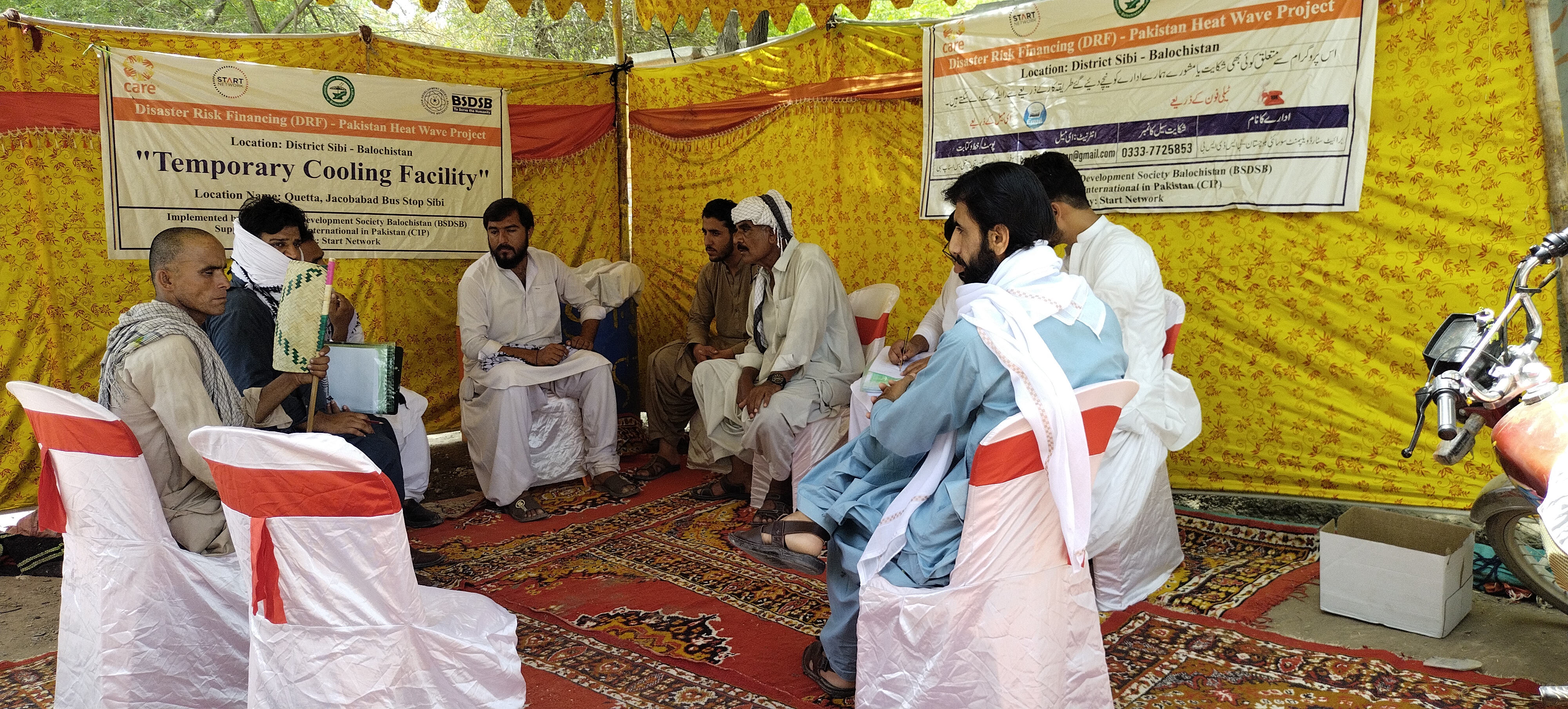In June 2021, Bright Star Development Society Balochistan (BSDSB), were funded through Start Network's Disaster Risk Financing programme in Pakistan to assist in mitigating an anticipated heatwave in Sibi (Pakistan). Bright Star provided behavioural messaging in addition to ‘cooling facilities’ that provided cold water and a place to rest. The Start Network Evidence and Learning team worked with GLOW Consultants (a private research company based in Pakistan) to conduct interviews with communities who received the assistance, and government officials who helped facilitate the project, to understand the impact of the response and how it could be improved in the future.
Our report from this research provides concrete evidence on ways in which communities benefited in terms of improved health and wellbeing, improved knowledge and positive behaviour change to mitigate against the effects of heatwave. Communities were also able to reflect and share ways that the assistance could be improved if it were to be provided again. These recommendations have already been built into Bright Star’s contingency planning for 2022 so that that if a heatwave response is triggered, they will be ready to act in accordance with community needs.
Because Bright Star is a local organisation, working and living in the community – they are able to act on learning as they will once again be acting to support the communities facing these hazards.
Recommendations suggested by project participants focused on improving access to the assistance that Bright Star provided. They included:
- Improving access to those who cannot read by using audio messages
Even though people noted that the use of pictures as well as text was good and that literate people can read the messages and inform other people about it, they suggested that audio messages could reach more people. They suggested these to be playing at the cooling facilities or be announced through a loudspeaker. In addition to helping reach those who cannot read or interpret the pictures, this may also increase reach to those who did not look at the posters. To bolster these findings, Bright Star also suggested that religious leaders could be invited to share the messages.
I think this is a good idea to convey audio messages using loudspeakers. Religious leaders can be engaged in the project activities to use the loudspeakers to convey ICE to public. I don’t see any challenges in engaging the religious leaders. Similarly, pretesting of the pictures is a good idea and can be helpful. [Naseer Channa, CEO Bright Star]
*ICE- Information, Communication and Education
- Improving access for women and girls by creating female-friendly spaces
Even though women noted that this facility fulfilled a need since it was difficult to find a place to rest outside of the home, both men and women noted that it could be made even more accessible to girls and women by creating a separate area for them and having a female staff member available to help them. To strengthen these findings, Bright Star also suggested that the space could be made bigger by removing some of the chairs.
We are already considering the idea of deploying a female staff member next time to ensure that women coming to cooling facilities don’t face any problems. The cooling facilities can be divided into two with a separator to have a separate facility for women and men. This will also ensure that women have a separate waiting area at the bus stop. Fewer chairs can be placed in both the cooling stations to make it more spacious for the people who leave after drinking water. Due to limited funding, these things were not implemented this year. [Naseer Channa, CEO Bright Star]
- Improving access for all by keeping the facilities open for longer
Though the majority of people reported on the benefits of the cooling facilities and noted that they were meeting a need, the need extended beyond the 20 days that the facilities were provided. People spoke about the heatwave continuing into July and mentioned that this access to cold clean water and a place to rest is something that should be available throughout every summer, as the heatwaves are a regular seasonal event.
The project was implemented for 20 days due to limited funding. Bright Star couldn’t ask for additional funding due to funding ceiling of £ 30,000. The funding ceiling has been revised to £ 60,000 now and we hope to generate a better response next year for a longer time duration. There certainly exists a possibility of extending the project to more days with additional funding. [Naseer Channa, CEO Bright Star]
Most of the recommendations had been constrained last year due to the budget cap. In planning for this year, Bright Star’s CEO, Naseer Channa is hopeful that he will be able to secure more funds and act on the suggestions made by the community.
This powerful example of closing the learning loop was facilitated by the honest and constructive feedback provided by participants. At Start Network, the Evidence and Learning team has been working hard to look for better ways of building trust with communities by changing what questions we ask and how we ask them. We also work with local researchers to ensure that the questions we ask and the way we ask them are culturally and contextually appropriate, allowing people to express their perspectives in their local languages with people they feel they can trust. We have asked communities how we should be measuring success and are exploring ways that we can also feedback our collaborative learning.
Following this evaluation of the heatwave response in June 2021, we are now working with Bright Star and GLOW Consultants on posters and leaflets that can be shared with communities. These materials will incorporate both the feedback they provided and how this initiative has informed the changes that Bright Star will make if they provide assistance again this year.

